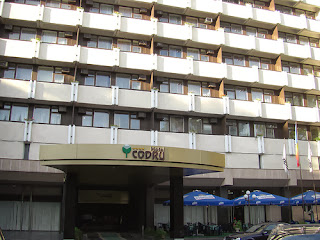 |
| Image of the Chișinau gates, the entrance to the city from the airport, by whl.travel, via Flickr.com |
Our suites were very large by eastern Europen standards, and not all that small by American standards, either. Each suite was furnished and had a living room, a dining room, a guest bathroom, an entrance foyer, a bedroom, and full bath. What was missing was a kitchen. But there was a dining room just for the VIP suites where we could get breakfast and dinner. There wasn't a fixed menu. We received the day's options typed with many sheets of carbon paper between the papers so we could each have a copy. The menu was prepared in both Russian and Moldovan, the same as Romanian except for idiomatic expressions and sometimes the alphabet. Until 1989, Moldovan had been written in Cyrillic, the same script as is used for Russian and several other Slavic languages. In 1989, the Moldovan Republic of the Soviet Union declared that Moldovan would henceforth be written using Latin letters, as had been used in Romania since at least the end of World War II. But sometimes the staff who prepared the menus forgot and they typed both the Russian and the Moldovan menus with the same Cyrillic typewriter. It didn't bother me since I knew both enough Romanian to get by and the Cyrillic alphabet from my college days of studying - but never mastering - Russian. But it displeased the ambassador no end when she was given a menu she couldn't read.
 |
| Image of the Codru Hotel by Sergey Vladimirov, via Flickr.com |
One evening the ambassador and Becky went to a concert where the printed program was in Moldovan, in Cyrillic. In order for either of them to understand the program, Becky had to sound out the words she could read from the Cyrillic, and the ambassador could translate what Becky said into English.
On our first day in Chișinau, David, who lived downstairs from us, picked us up, gave us the equivalent of $4.00 in rubles (Moldova used Russian rubles for about nine more months before they introduced their own currency) and brought us back to the embassy to show us everything both upstairs and down. Before I arrived in Moldova, I looked forward to identifying the priorities before beginning to work. In other words, I assumed some of the work wasn't urgent. After a quick walk though the building, everything I saw that needed to be done looked urgent. There were holes in the floor, in the walls, and in the ceiling. The electricity was so unreliable that the power surge units, made in Germany, beeped all the time as warning that the power source was dipping below or spiking above acceptable levels. In order to get any work done, the staff stopped using the surge protectors. It seemed it wouldn't matter where I started first - everything was equally urgent.
David also took us to the open air market where we saw people lined up along the route leading to it holding what they had to sell from their personal possessions. Some people were holding a single shoe. Others had boxes of bent nails or unmatched buttons.
 |
| Image of Stefan cel Mare statue in Chișinau by Guttorm Flatabø, via Flickr.com |
During our afternoon stroll, we picked up a few things, but we didn't manage to spend our entire $4.00 worth of rubles. It began to look like we would be able to save up for a down payment on a house during this tour. Things were looking good.
No comments:
Post a Comment